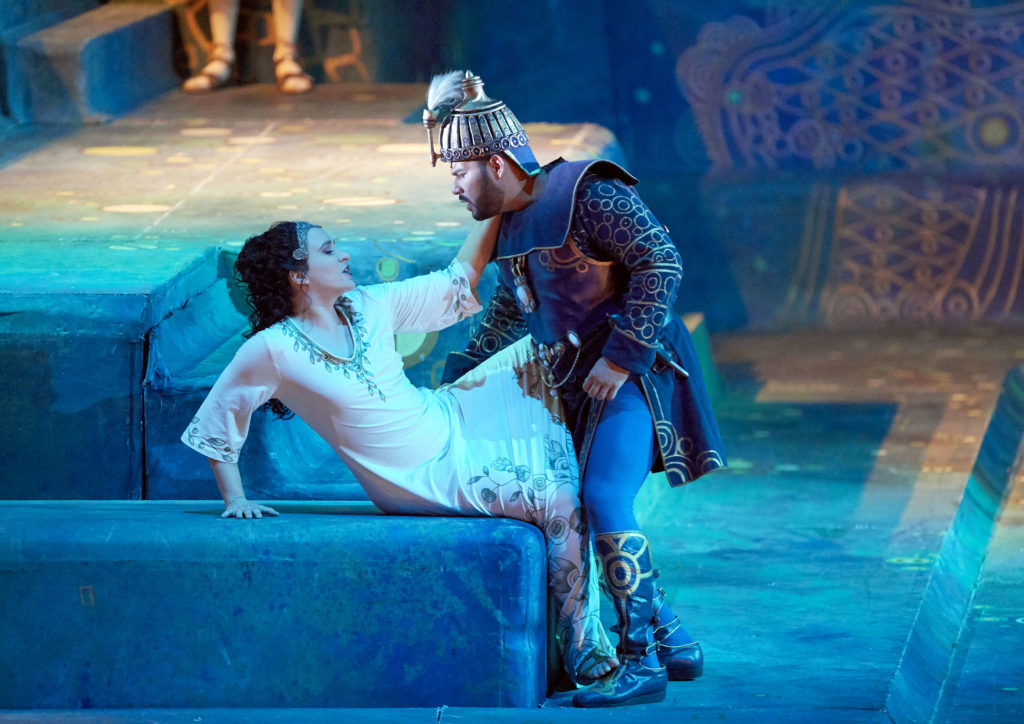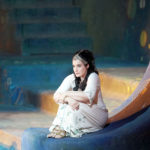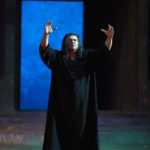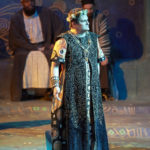 Richard Strauss’s Salome, premiered 1905, provoked a furore, both for its scandalous subject, based on the play by Oscar Wilde, (Strauss’s German libretto), and the modernity of its music. Strauss broke the boundaries of tonality- the opera’s final cord shocking in its dissonance; truly revolutionary, years before Stravinsky’s iconoclastic Rite of Spring (1912).
Richard Strauss’s Salome, premiered 1905, provoked a furore, both for its scandalous subject, based on the play by Oscar Wilde, (Strauss’s German libretto), and the modernity of its music. Strauss broke the boundaries of tonality- the opera’s final cord shocking in its dissonance; truly revolutionary, years before Stravinsky’s iconoclastic Rite of Spring (1912).
Oscar Wilde,famous for his brilliant wit, was yet a moralist and commentator on society. He was fascinated by the Christian biblical tale, in its perverse eroticism and barbarism. Also Wilde’s aestheticism was preoccupied with beauty for its own sake, independent of conventional morality.
It’s appropriate then that Vienna State Opera’s stage set draws on jugendstil (art nouveau) design , suggesting a luxuriant decadence that defined the new art at the turn of the 20th century.
The tiered steps of the Colosseum-like stage set (Jürgen Rose) are covered in a Klimt inspired decoration, gold symbols in a mosaic of jewelled colours . Back of stage there’s a Japanese tree in silhouette , stylised as in a mural.
 Salome- Herod’s daughter, who leaves the banquet in a surly mood- is described as seltsam (strange), like a woman who is dead. So pale, never seen her so pale, like a white rose. Grun-Brit Barkman, platinum blonde, is a slight figure, a slim, cool beauty- physically the adolescent young woman. Her soprano has a crystalline clarity, but colourless, somehow lacks reserves of dark passion: the psychotic capable of demanding, in revenge, the head of John the Baptist, who all but ignores her lustful advances.
Salome- Herod’s daughter, who leaves the banquet in a surly mood- is described as seltsam (strange), like a woman who is dead. So pale, never seen her so pale, like a white rose. Grun-Brit Barkman, platinum blonde, is a slight figure, a slim, cool beauty- physically the adolescent young woman. Her soprano has a crystalline clarity, but colourless, somehow lacks reserves of dark passion: the psychotic capable of demanding, in revenge, the head of John the Baptist, who all but ignores her lustful advances.
Jochanaan der Taube (John the Baptist), the prophet who emerges as if out of the dead, is being held captive in a cistern, an underground cell positioned in the middle of the stage, guarded by Roman centurions. Salome, fascinated by the voice she hears from underground, demands to see him . Against Herod’s wishes, she persuades Narrabeth (Carlos Ozuna) to free him . Barkmin, a very physical actress, wearing an alluring white silk dress with embroidered gold decoration , all but seduces the Captain of the Guard. How terrible it must be to lie there, (beneath what looks like a drain cover.) She simply wants to see the curious prophet. Barkman’s is a light seductive soprano.
A wild figure all in black emerges, Jochanaan, (Zelijko Lūcik) in a black cassock, with long black hair. Lucik’s baritone has glorious timbre . (He’s frequently cast here as Nabucco.) He sings with enormous dignity and nobility. He, other-worldly, a spiritual man , is being tantalised by a silly girl. She sings of his ivory white skin. She wants to get closer. He doesn’t want to know her, the daughter of Herodias.  But for her, his indifference is music to her ears. He pulls away from this ‘daughter of Sodom’. I’m in love with your body, sings this teenage girl (like she saw him on Facebook with her I-phone.) Get back, daughter of Babylon! He will listen only to the voice of God. It goes on, she, lewdly suggestive- his hair is like a vineyard, his lips red like a pomegranate- his repeating, there’s only one who can save him.
But for her, his indifference is music to her ears. He pulls away from this ‘daughter of Sodom’. I’m in love with your body, sings this teenage girl (like she saw him on Facebook with her I-phone.) Get back, daughter of Babylon! He will listen only to the voice of God. It goes on, she, lewdly suggestive- his hair is like a vineyard, his lips red like a pomegranate- his repeating, there’s only one who can save him.
This Jochanaan, Lucic, seems relatively young, good-looking -not the gnarled, hermit-like figure we would expect. So their interchange- a sparring match between the monk and the profane bitch – has an electricity because plausibly dangerous.
Herod’s court assemble on the top of the ampitheatre steps. Herodias (Iris Vermillion) wears an outrageously plumed hat, her dress, exotic art nouveau design, out of a Klimt pattern book. With her husky mezzo, she has a camp manner; but deadly serious in demanding the blood of Jochanaan for repeatedly condemning her immorality: she wants him silenced once and for all. Now is the time!
But Herod, (Wolfgang Ablinger-Sperrhacke) is concerned about Jochanaan’s status as a cult religious leader, even rumoured to be a Messiah. Ablinger-Sperrhacke, dressed in splendidly patterned robes, comes over as effeminate and indecisive, lacking the heft of authority.
Herod want his daughter dance for him: Salome agrees, provided Herod grants her every wish. In the famous Dance of the Seven Veils , Barkmin is the real thing. Can she dance! It’s astonishing that the role makes exceptional vocal demands, while requiring formidable dance skills. Salome demands ‘the volume, power and stamina of a true dramatic soprano’, convincing as a young woman; and physically ‘the agility and gracefulness of a prima ballerina.’
Opening with an array of brightly coloured veils, the brilliantly choreographed movements become increasingly frenzied. Barkmin dances as if possessed, down to the last and black veil, her back to us as she faces Herod and Herodias naked full-on.
 Herod admits he entered into an oath, ein Eid geschworren. But he demurs, holds out to the end. He offers her just about everything , from emeralds to the palace itself. But she still demands the head of Jochanaan on a platter. (Her revenge for his contempt of her?) Herod may well be frightened to hysteria at the unforeseen consequences; nevertheless Ablinger-Sperrhack’s lyrical tenor can hardly prevail over the sheer weight of Strauss’s orchestration. Vienna State Opera’s orchestra pit was filled to capacity with a full orchestra, (percussion including 5 timpani,tam-tam, tambourine, castanets, glockenspiel and xylophone.) Simone Young, highly regarded, is repeatedly invited back to conduct Strauss.
Herod admits he entered into an oath, ein Eid geschworren. But he demurs, holds out to the end. He offers her just about everything , from emeralds to the palace itself. But she still demands the head of Jochanaan on a platter. (Her revenge for his contempt of her?) Herod may well be frightened to hysteria at the unforeseen consequences; nevertheless Ablinger-Sperrhack’s lyrical tenor can hardly prevail over the sheer weight of Strauss’s orchestration. Vienna State Opera’s orchestra pit was filled to capacity with a full orchestra, (percussion including 5 timpani,tam-tam, tambourine, castanets, glockenspiel and xylophone.) Simone Young, highly regarded, is repeatedly invited back to conduct Strauss.
Shrill flutes and piccolo, stabbing intervals of woodwind, snare drum rolls: sounds out of a vision of hell. Barkmin holds ‘the head’ on a silver plate, front of stage. In her monologue, she sings, you didn’t want my mouth to kiss you: now she will kiss his mouth, bite on it like a ripe fruit. The stage is now bathed in a blood-red light. He spoke nasty words to her: now she can do what she wants. Barkmin is wearing a black gown , embossed in an oriental gold pattern. She gloats, I’m living , you are dead , and your head belongs to me. You have seen your God, Jochanaan, but never seen me. I was a Princess, a virgin, and you despised me . And the secret of love is greater than the secret of death. Und das Geheimnis der Liebe ist grosse als das Geheimnis des Todes.
In her aria, Barkmin’s singing is technically proficient , but lacking in that desperation, the sense of high drama -even of derangement or psychosis: Barkmin is too cool. I don’t remember any exceptional high notes. (And dramatic sopranos in this iconic Straussian role are legendary.)
Herod curses her as a monster , Ungeheuer, ordering her execution. We last see Barkmin, front stage, addressing the head at her feet. She has kissed his lips. A bitter taste. They say love tastes bitter. (Surely Wildean ?) Strauss’s orchestration uses dissonance, an ‘expressionism’, radical for its time, chilling in its intensity. Uncomfortable, prescient of the 20th century, its modernism with contemporary resonances.
Plaudits to Vienna State Opera for keeping Barlog’s magnificent jugendstil production. Even if tonight’s cast were not ideal , Simone Young’s Vienna State Opera Orchestra excelled.© PR. 16.9.2017
Photos: Grun-Brit Barkin (Salome) and Caros Osuna (Narrabeth); Grun-Brit Barkin (Salome); Zelijko Lūcic (Jochanaan); Wolfgang Ablinger-Sperrhacke (Herod)
© Wiener Staatsoper/ Michael Pöhn
